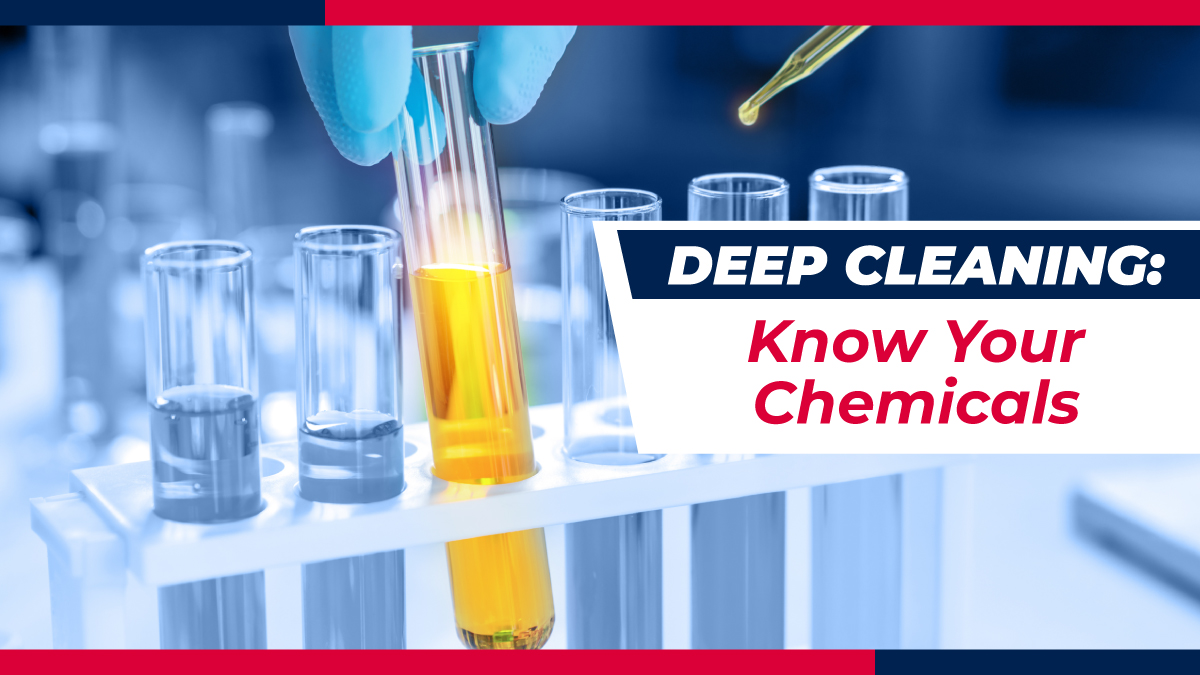
Everyone wants to live in a clean and safe environment. With hundreds of deep cleaning products on the market, it can be difficult to navigate which products are the most effective. When choosing a deep cleaning product, it is important to consider its chemical makeup. Many deep cleaning solutions contain chemicals, that when used incorrectly, can be detrimental to your health.
At the end of the day, it is important to know what chemicals you are handling when cleaning. Without an in-depth knowledge of the types of chemicals found in deep cleaning products, you could be putting yourself and your loved ones at risk.
Common Chemicals Found in Deep Cleaning Products
Many soaps and cleaning products on the market are made of similar chemical makeup. Here are the most common chemicals found in cleaning solutions and their uses:
- Acids: Acids are both organic and inorganic compounds used in cleaning products. They can be as gentle as citric acid or as corrosive as Peracetic acid. They are found in the majority of cleaning solutions, including homemade ones.
- Alcohol: Alcohol is used to sanitize all types of surfaces, from floor tiles to the human skin. It is the most common component found in household cleaners such as sanitizing wipes and hand sanitizer.
- Aldehydes: Aldehydes, like glutaraldehyde, ortho-phthalaldehyde, and formaldehyde, are used to kill fungus and spores. They are typically found in hospital-grade disinfectants. Be wary of glutaraldehyde, as studies have found that it can cause asthma.
- Bases: Bases are substances used to promote chemical reactions. Bases can be anything from Ammonia to baking soda. They often serve as a way to neutralize acids and lay the groundwork for all standard and organic cleaning products.
- Chlorine & Chlorine Compounds: Chlorine is used to kill viruses, bacteria, and spores. Chlorine deactivates pathogens when added to drinking water, swimming pool water, and when used on common household surfaces. Chlorine and Chlorine compounds are found in most cleaning products.
- Hydrogen Peroxide: Hydrogen peroxide is a high-level disinfectant used to clean hospital surfaces. It is preferred in hospitals due to the fewer allergic reactions to those who are in contact with it. Hydrogen peroxide can be used to clean surfaces in original concentrate or in a diluted solution.
- Idophors: Idophors are solutions containing iodine. Idophors are water-soluble and are used to clean glass and metal surfaces. While effective in disinfecting surfaces, it does leave a brown stain behind.
- Phenolics: Phenolics are the oldest disinfectants. They are found in disinfectant soaps, body washes, and antiseptic solutions. Although commonly found in certain personal hygiene products, they can be toxic. When combined with chemicals like acetone, ethanol, diethyl ether, and chloroform it is lethal, especially to cats and infants.
- Quaternary Ammonium Compounds: Quaternary ammonium compounds are a group of related ammonia compounds found in low-level cleaning products. They are highly effective against common bacteria; and when combined with 200ppm+ alcohol solutions they can kill viruses like norovirus, polio, and rotavirus. Clorox, Lysol, and Mrs. Meyers all contain these compounds and are the safest to use in your home for all your deep cleaning purposes.
These common chemicals fight bacteria and viruses in our homes, but it is crucial that we know which are harmful and which are safe to use. Even if you decide to make your own deep cleaning solution, some of these chemicals are inescapable.
Homemade Cleaning Products
Homemade cleaning products are typically made with white vinegar (phenolic acids and aldehydes), ammonia (bases and quaternary ammonium compounds), baking soda (bases), and citric acid (acids). These products contain the same chemical signature as store-bought cleaning solutions.
Homemade cleaning solutions are more affordable and are effective when it comes to deep cleaning your home. Though they do not contain all the same chemicals as store-bought cleaning products, they will help keep your home’s surfaces clean.
The Safest Way to Deep Clean
Begin deep cleaning your home by gathering all the necessary tools. You will need:
- Rubber Gloves: Rubber gloves that are chemical resistant and reach your forearm will be the best for protecting your skin.
- Cleaning Sponges: Abrasive sponges often work best when deep cleaning your home because they can be used with all cleaning products and on most surfaces.
- Water: Standard tap water is sufficient.
- Bucket: A plastic bucket will work best because it will not react with the chemicals in most cleaning solutions.
- Cleaning Solution: Choose the cleaning solution you are most knowledgeable of and comfortable with.
Material Data Sheets
Which cleaning solution should you use? That is up to you; however, there is one resource that can help: Material Safety Data Sheets.
The Material Data Sheet will provide you with the chemical makeup of a product and the tools you will need to use it safely. Material Data Sheets can be found on the safety label for all cleaning products; meanwhile, more detailed Material Data Sheet information can be found on the cleaning product’s website.
Final Thoughts from USHEALTH Group
With all this in mind, you now have the ability to choose the best deep cleaning products for you and your family. Deep clean your home with peace of mind by knowing the facts about your cleaning product’s chemical makeup.
USHA-WB11-0920